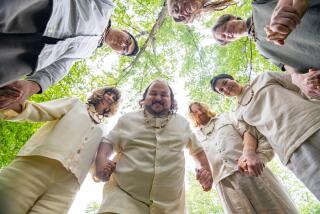Conventional vs. Unconventional : Creator of Droll Comics Will View Stage Version at Convention
“It’s been a hectic week,” director Vince Waldron explained to last Saturday night’s sold-out audience at Hollywood’s Theatre/Theater that had just viewed his production of “American Splendor,” the nine-months-and-running play adapted from Harvey Pekar’s droll comics of the same name.
Pekar will be attending San Diego’s 22nd annual Comic Convention at a 4:30 p.m. Saturday performance of “American Splendor,” and an 11 a.m. Sunday panel discussion at the Convention Center on West Harbor Drive. “We’ve been trying to get Harvey out here for a while,” Waldron added.
At last, “Harvey” had finally made it. Nestled in the tiny theater’s back row, next to his wife, Joyce Brabner, Pekar viewed for the first time what Waldron and his cast had done with his comics--and, by extension, with his life story.
Pekar’s books (issue No. 16 will be available in a matter of weeks) are about many things--everyday life in Pekar’s native Cleveland.
Waldron’s play adaptation selects several wry, ironic stories from the Pekar opus, ranging from his bizarre fling with a woman welshing off men and speaking in a phony British accent, to hilarious encounters with a nerd who memorizes every second of every movie he sees and an elderly man who writes haiku poetry and begins, but never finishes, tales of old Cleveland. Typically, the stories begin with an incident and fade out with a reflective coda.
The 51-year-old author was watching his life being played out. And what did he think? “This is the best production of my work, by far,” he said, arching forward in his seat. “It’s much better than the adaptation done by a major theater, the Arena Stage (in Washington) in 1987.”
Extremely high praise, considering the source. His friends will remark about how particular and exacting Pekar is, what high standards he demands, for example, from illustrator-collaborators like Robert Crumb, still the star of underground comic artists.
“Harvey has very definite opinions,” noted John Oates, head of Four Walls Eight Windows, the small publishing firm producing “The New American Splendor Anthology,” the third collection of Pekar’s work due in September. “He doesn’t waffle on his own work, or how others handle it, or politics, or anything. He sees himself as a guerrilla intellectual.”
That role stems from Pekar’s livelihood, which he has eked out for decades as a file clerk at a Cleveland Veterans’ Administration hospital. Despite his limited budget (the self-published books and the anthologies have never been lucrative) Pekar had planned to come to Los Angeles soon after the play’s October, 1990, opening.
Then, a new life drama got in the way.
“I had always been a pretty healthy, strong guy,” he said in a phone interview after Saturday’s performance. “Suddenly, last fall, I had lymphoma. Luckily, the cancer was localized and after the November operation, the doctors told me that they got it all.”
It seemed that the show would close before Pekar would see it. After all, by May, it had already enjoyed a longer run and more rave reviews than most L.A. plays ever hope to have. Director Waldron was loathe to recast the Pekar character, and actor Dan Castellaneta (the voice of Homer Simpson on “The Simpsons” and a co-star on “The Tracey Ullman Show”) was expected to leave for out-of-town film work.
Then, according to Waldron, box office picked up, Castellaneta didn’t have to leave town, and “American Splendor” would keep going.
And Pekar was, slowly, feeling better. In his books and on stage, Pekar’s writing sways back and forth between despair and hope for his own life and humanity’s fate, and it is this state of mind that has set his comics apart from the underground world’s nihilism and pop comic’s youthful macho fantasies. As a result, he said, “The fans for my work have never been comics fans, but readers of 20th-Century literature.”
These would seem to be bright days for Pekar. The signs are everywhere: a host of meetings with film and television producers for possible deals, the Theatre/Theater audience’s applause, the plaque given to him by the cast, his slated appearance in San Diego. Yet, Pekar admitted that he was leaning toward despair.
“My bout with cancer has shaken my self-confidence,” he said. “I’m trying to recover my optimism, but I’m not sure I can do it.”
He wasn’t thinking only of his health, but his own and the nation’s prospects. “When I read the news it just hurts me--our collapsing schools and infrastructure, the gap between the rich and the poor. The country seems to be getting worse.
“I’ve been approached with movie deals before--Jonathan Demme contacted me in 1979--but nothing ever happened. Hollywood people treat my stuff like kids pressing their faces against a candy store window: They like it inside, but they don’t know how to get there, and they don’t understand it in the first place. So I’m not too confident that anything will happen this time, even though I need the gelt .”
Pekar did see one bright prospect in the generally cloudy picture. “It did surprise me how well Vince adapted the material for the stage, and cast it so well. If I were him, I’d keep the show going with fresh stories. I’m giving him a new one that’ll appear in the next book. The show could keep going forever that way.”
More to Read
The biggest entertainment stories
Get our big stories about Hollywood, film, television, music, arts, culture and more right in your inbox as soon as they publish.
You may occasionally receive promotional content from the Los Angeles Times.










